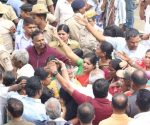Banu Mushtaq: A story born under a banyan tree in my village can cast its shadow across the world | Bengaluru News

Hassan: Writer Banu Mushtaq scripted history Wednesday, becoming the first Kannada author to win the International Booker Prize. Her short-story collection, Heart Lamp, translated into English by Deepa Bhasthi, is also the first anthology to receive the prestigious award. Mushtaq, a long-time voice of resistance in Kannada literatureand an early participant in the Bandaya Sahitya (a radical forum of writers) movement which began in 1970s, said the international recognition affirmed both literary strength of the Kannada language and the universal relevance of its stories. She described the award-winning moment as “a thousand fireflies lighting up a single sky” and reflected on the significance of the award, literary journey, and the power of storytelling to spark social change.Excerpts:Did this award come as a surprise?Moments before the announcement were tense, unforgettable. When author Max Porter announced Heart Lamp as the winner, an electrifying atmosphere took over. Everyone stood up and began congratulating me, including my relatives who were present. It felt like a thousand fireflies lighting up a single sky. I was, indeed, thrilled.How do you interpret the significance of this award?I never imagined stories from my corner of the world would travel this far. This is a moment for all regional-language writers in India. This is also a victory for diversity. The award recognises countless women, whose lives echo through these stories. I’m grateful to Deepa Bhasthi for giving my words a “new lease of life” through translation.How do you view your role as a writer amid threats and social division?As a critical insider, I’ve faced ostracism, threats, and trauma. I believe a writer’s task is to document injustices artistically — exposing misuse of power, political manipulation, and women’s struggles — without preaching. In today’s divided world, with increasing policing of women and hate-driven politics, I remain hopeful. History shows oppressive regimes fall, and despite challenges, change is inevitable.How do you feel a short-story collection selected for Booker Prize for the first time?Short stories often receive less attention than novels, but I love the form. Every literary form has its place. It’s unfair to rank novels above short stories or create a hierarchy between them.What impact will this award carry on Kannada literature?This prize demonstrates the true potential of the Kannada language and its literature. If more Kannada works are translated into English and other languages, we can introduce our stories to a global audience. This story is a love letter to my belief that no tale is ever just local. A story born under a banyan tree in my village can cast its shadow across the world.Your stories challenge caste, class, and gender hierarchies. What inspired them?The English version of the collection is based on my anthology in Kannada — Edeya Hanate (Heart Lamp). The material comes from life itself. I observe people and society. I also gather compelling human stories from newspapers. As an advocate and mediator, I often provide legal counsel for free, especially for women. During consultations, they not only share their legal issues but also their emotional struggles. I maintain two sets of notes — one for the case, and the other for their personal narratives.These emotional experiences become the foundation for my stories. I empathise with their pain, and that shapes my creative expression.How did you select the stories for international readers?The selection was collaborative. Deepa read five of my anthologies and selected stories that moved her. I suggested a few as well. She would say, ‘I love this story for this reason’. I respected her choices because if she was so deeply impacted, others, too, would be. The emotions in these stories are universal. Women from India to Japan to France face similar control and subjugation. When they read these stories, they recognise themselves.That is the very essence of this collection.You emerged from the Bandaya Sahitya movement…Bandaya is not just a movement — it’s a state of mind. It represents resistance against injustice. Society, sometimes, imposes harsh rules and demands that individuals conform. At such times, we must confront it. I question society, politics, religion, and patriarchy. Bandaya remains relevant today as a mindset and a way of life.Many stories centre on marginalised voices. What role does literature play in social change?Let me share a story. A Muslim woman from the coast visited me recently. She told me about her suffering and said she didn’t know what to do next. I asked her why she came to me when there are so many advocates in Hassan. She said she had watched ‘Hasina’, a film that won three national awards, based on my story. Decades later, she rewatched it, and it gave her answers. She said, “I thought you were the right person to help me.” That’s when I felt my writing had made a difference.As one of the few women in the Bandaya Sahitya movement, how did that shape your voice?The 1970s saw the rise of Bandaya movement in Hassan, a hub of activism in women’s rights, Dalit literature, and the unique concept of Muslim Sahitya Samvedane in Kannada. This movement sparked widespread protests and social change across Karnataka and India, influencing politics and literature. As a journalist in Hassan, I witnessed daily demonstrations and the efforts of senior leaders firsthand. These experiences shaped my perspective and writing.My reflections on these hardships inspired much of my literary work.
















